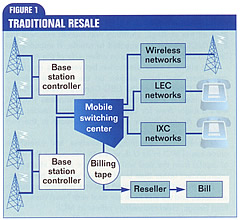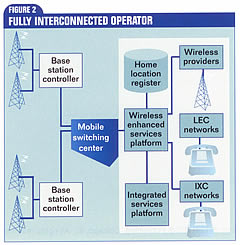
Plug and play
MCI's wireless strategy connects
By Jason Meyers
November 11, 1996
A historical examination of MCI's involvement in the
wireless
marketplace could lead some to write the company off
as too meager to
matter.
After all, MCI gave up its cellular holdings to McCaw
in 1985, and
those properties later became part of the AT&T empire.
MCI's plan for
a wireless consortium that it would oversee was rejected
by the
Federal Communications Commission. A strategy to invest
in Nextel
faltered and was ultimately abandoned. And last year,
MCI shied away
from the personal communication services licensing process
from which
Sprint and AT&T emerged as the primary beneficiaries.
But just as it appeared that wireless might not be
in MCI's cards, the
carrier has unleashed a tactical plan proving it is
intent on taking
wireless by storm.
"We have done a number of things on strategy since
we envisioned this
two years ago," said Whitey Bluestein, vice president
of wireless
strategy and development at MCI Communications.
In May 1995, MCI acquired Nationwide Cellular, the
country's largest
cellular reseller, and began offering MCI-branded service
a month
later. In August, the carrier announced resale deals
with five major
cellular operators. That put the carrier in 27 U.S.
cellular markets
with 124 potential customers.
And earlier this year, MCI struck a 10-year, 10-billion-minute
deal
with NextWave to interconnect its landline network to
NextWave's PCS
networks and resell minutes of use, adding an additional
63 potential
markets and 110 million pops.
"The NextWave deal really laid out the next generation
of wireless
service for us," said Bluestein. "It was really
the vision we had for
wireless from the get-go."
The distinguishing mark of that vision is interconnection.
Traditional
resellers or wireless service can only repackage service
and integrate
billing. (Figure 1).

By connecting its wireline base to the switches and
RF portion of
NextWave's networks, MCI controls not only billing but
also service
differentiation via its intelligent network. (Figure
2).

"We stepped back and said, 'There are going to
be a lot of people out
there with facilities. Let's spend the money on something
we already
do well: our intelligent network and infrastructure,'"
said Bluestein.
"With full interconnection, we can look very much
identical to a
facilities-based provider."
That includes being able to offer components such as
operator, 800
number and calling card services, in addition to virtual
private
network services. The carrier bundles its wireless offerings
into its
MCI One package for consumers and networkMCI One bundle
for
businesses. Over the past six years, MCI has invested
more than $2.5
billion in its integrated services platforms, Bluestein
said.
For all that, the capital expense for MCI lies primarily
in the terms
it negotiated with NextWave for interconnection. "The
network
architecture is virtually unchanged from what we had
three or four
years ago when we were talking about the consortium,"
Bluestein said.
One industry analyst who has followed MCI's wireless
saga said he
questioned the resale/interconnection strategy when
MCI first
announced it but that events since have changed his
mind.
"It looks like it was a pretty good move,"
said Peter Gibson,
president of the communications services division of
Trecom Business
Systems. "Companies paid so much for their licenses
that they're going
to want to get money back quickly." Arrangements
like the one NextWave
and MCI formed is one way to accomplish that, he said.
And the NextWave deal is not the end of MCI's wireless
road. The
carrier plans to strike deals with other PCS providers
- most likely
additional C block operators or those that emerge from
the current D,
E and F block auctions. NextWave's code division multiple
access
technology (CDMA) choice is a strong indicator that
other
interconnection deals would be with CDMA providers,
but Bluestein
didn't rule out the possibility of other technologies.
He also noted
that technology at that stage is not the overriding
issue.
"The luxury of the strategy we have is that we
don't have to
participate in the religious wars about air interfaces,"
he said.
COPYRIGHT 1996 PRIMEDIA Business
Magazines & Media Inc. All rights reserved.
|